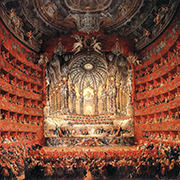Gluck, „a young man of the highest abilities and a fiery spirit“, composed his opera „Antigono“ for Rome. In July this thrilling stage work can be heard once again in Bayreuth.
When Christoph Willibald Gluck composed the opera Antigono in 1755/56 and premiered it in Rome, he had already more than adequately demonstrated that he had mastered the craft of opera composer – most recently in 1752 in Naples with the success of his opera La clemenza di Tito, which caused a sensation far beyond the city and opened up new perspectives for him. These included a commission to compose a new work for Rome, in which several high-ranking personalities were involved.
In Rome and throughout the entire Papal State special conditions applied to the performance of opera. As a papal decree basically prohibited women from appearing on the stage, in opera productions the female roles had to be performed by castrati, and so it was with Antigono: the ensemble at the premiere on 9 February 1756 comprised a tenor in the title role and four soprano and one alto castrati. The premiere itself was anticipated in Rome with great excitement. With Antigono the impresario of the Teatro Argentina had consciously chosen a popular drama by Metastasio, which had never previously been performed in his native city. Described as “a young man of the highest abilities and a fiery spirit”, Gluck was commissioned by the impresario Carlo Mattei, who was under considerable pressure following a series of failures. The fact that the much hoped-for sensational success proved elusive was probably mainly to do with the general mood, the efforts of an altogether mediocre ensemble of singers and deficiencies in the stage machinery.
The plot of the opera follows contemporary dramaturgical conventions of Metastasian opera seria. A subject matter from ancient history – military conflicts between Antigonos II Gonatas and Alexander II of Epirus in the third century BC – form the background to a complicated interconnected plot around a young pair of lovers of noble birth. The Egyptian Princess Berenice, engaged to the Macedonian King Antigono, but assiduously courted by his adversary Alessandro of Epirus, secretly loves Demetrio, the son of Antigono, who reciprocates these feelings. Both end up in the whirl of political complications, competing power interests and a sophisticated web of intrigues before a happy ending, obligatory for the genre, finally unites the lovers.
Gluck’s music consists, as prescribed by the text, almost exclusively of arias. Only at the end of the second act do Demetrio and Berenice join together in a duet, and in the third act with the “Scena di Berenice” Gluck composes a major dramatic-musical complex, rich in contrasts, comprising accompagnato-recitative (the only one in the opera), arioso and a concluding dramatic fully-developed aria.
Like many other works from the short flourishing of Italian opera in the 18th century, Gluck’s Antigono also disappeared from the repertoire after just a few performances and then fell into oblivion. Some pieces nevertheless sound familiar today, and this is due to the fact that Gluck borrowed around a third of the numbers from his own earlier works, and also included some pieces in later compositions. Demetrio’s aria “Già che morir degg’io”, for example, became Orfeo’s “Che puro Ciel” six years later in Gluck’s first “reform opera” Orfeo ed Euridice, whilst Berenice’s highly expressive aria “Perché, se tanti siete” was heard again in 1779 in Paris as Iphigénie’s aria “Je t’implore et je tremble” in Iphigénie en Tauride. But it is not only these almost timeless musical showpieces which make Antigono attractive for contemporary opera houses too. Rather, the work as a whole captivates through its thrilling shaping of dramatic conflicts and passions and the great stylistic breadth of the arias, which range from lyric-cantabile to virtuoso-highly dramatic – an impressive panorama of the richly varied vocal art of Italian opera of the 18th century.
- Irene Brandenburg
- (from [t]akte 1/2019 – translation: Elizabeth Robinson)



